FC Dinamo Bucureşti
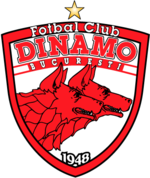 |
||||
| Full name | Fotbal Club Dinamo Bucureşti | |||
|---|---|---|---|---|
| Nickname(s) | Câinii Roşii (Red Dogs) Alb-Roşii (The White and Reds) |
|||
| Founded | 14 May 1948 | |||
| Ground | Dinamo (Capacity: 15,300) |
|||
| Chairman | ||||
| Manager | ||||
| League | Liga I | |||
| 2009–10 | Liga I, 6th | |||
| Website | Club home page | |||
|
||||
FC Dinamo Bucureşti is a Romanian professional football club based in Bucharest. They became the first Romanian team to reach the European Champions Cup semifinals in 1983-84.
Contents |
History
Beginning
On 14 May, 1948, "Unirea Tricolor MAI" — newly entered, in January 1948, under the umbrella of the Communist regime's Internal Affairs Ministry — merged with "Ciocanul Bucureşti" and formed "Dinamo Bucureşti", the sporting club representing the above-mentioned institution.
Until the end of the championship, Dinamo was going to be represented by two teams: "Ciocanul" ("Hammer"), named "Dinamo A" and "Unirea Tricolor MAI", known as "Dinamo B" (this last one relegating, at the end of the football season, into the Divizia B). Starting with 1950, Dinamo A was separated from Dinamo B, the latter being transferred first to Braşov, then to Cluj-Napoca, and eventually, in 1958, being dissolved.
Dinamo Bucureşti was going to follow its Communist destiny at the highest football level. The "Dinamo" name was used for the very first time on 1 May, 1948. Nevertheless, the real debut of Dinamo was on the 1947-48 Divizia A edition (finishing 7th). Some of the team's players were Ambru, Angelo Niculescu, Teodorescu, Siclovan, Bartha, Sârbu. On July 14, 1948 Dinamo played its first international match against Zidnice (Czechoslovakia): 4 to 1 for the red-whites. August 22 will remain a reference date for Dinamo's football, representing the debut of Dinamo Bucharest in the first national Division. The pioneers were, among others, Titus Ozon, Lăzărescu, Naciu. The team's first coach was Coloman Braun Bogdan. At the end of the '48-'49 edition, Angelo Niculescu retires, dedicating himself to the coaching career rewarded later with great victories with Dinamo and with the national team. In 1950, new football players arrived at Dinamo: Dumitru Nicolae, Băcuţ I.
The current Dinamo Stadium was inaugurated on 14 October, 1951. The first match: Dinamo-Locomotiva Timişoara 1-0. Dinamo finished runner-up in the 1951-52 and 1952-53 seasons. Also in 1953, Dinamo played the Final of the Romanian Cup: 0-2 with Metalul Reşiţa.
The 1970s
The 6th title: in 1971. In CCE, Dinamo eliminates Spartak Trnava, the team of Dobias, Kuna and Adamec. A new player: Florea Dumitrache. What follows is a double win against Israel's and Van Hanegem's Feyenoord: 0-3 and 0-2. The 7th title comes two years later, in 1973. In CCE, they surpass Northern Ireland's Crusaders Belfast ( The 11-0 home game against Northern Ireland's team is still the biggest margin of victory in the history of the European Cup ), but fail against Atlético Madrid (0-2 and 2-2), the team of Capon, Irueta, Heredia and Ayala. The next year Dinamo plays in the UEFA Cup and after the eliminating Bolospur, fails in the confrontation with F.C. Koln: 1-1 and 2-3! The 8th big success was going to come in 1975, year when Dudu Georgescu receives "the golden boot" (with 32 goals). In '76 in the UEFA Cup Dinamo plays against another "sacred monster" - AC Milan - with Fabio Capello and Collovatti on its side: 0-0 and 1-2. The 1976-1977 first season brings the 9th title and a new golden boot for Dudu Georgescu (47 goals). In the autumn of '77 in the CCE, Dinamo wins a thrilling game against Atlético Madrid 2-1, but loses at Madrid, 2-0. In the second round of the UEFA Cup (after eliminating Alki Larnaca from Cyprus) Dinamo is eliminated (partially because of the referee) by Eintracht Frankfurt, team of Pezzey, Grabowsky and Holzenbein (2-0 and 0-3 in prolongation).
The 1980s
The 1981–82 UEFA Cup season brings some great wins for Dinamo. The red-whites meet Levski Sofia, team of Sirakov and Iskrenov (3-0 and 1-2). In the second round, a terrifing "double": Dinamo-Internazionale (with Bergoni, Bagni, Prohaska, Altobelli, Baresi, Oriali, Marini and Becallossi). At Milan, 1-1 (authors: Pasinato and Custov) and back home in Bucharest, 3-2 for the "dogs", in the extra time! Dinamo is eliminated by the Swedish team IFK Göteborg, which later ends up winning the trophy.
The 10th national title will be obtained in 1982, when Dinamo also conquers the Cup after a 3-2 victory against Baia Mare. After a 5 year absence, Dinamo reappears in the European Champions Cup, meeting (and eliminating) Vaaleregen Oslo. In the next stage, Dinamo had to confront a difficult opponent: the team of Vizek and Nehoda, Dukla Prague. They win at home, with 2-0, obtaining the qualification at Prague: 1-2. Dinamo is eliminated by Aston Villa, club of Bremmer, Cowans, Withe, Shaw and Morley. The 11th title come one year later, in 1983. The 1983-1984 season began with the retirement of Cornel Dinu, winner of 6 national titles and 6 national cups, with 454 caps in the first league and 75 in the national team. Still the same year Dinamo wins the 12th title.
The autumn of 1983-84 was going to represent a valuable step into the international arena. The "European Champions Cup campaign" started with the Finnish team, Kuusysi Lahti (1-0 and 3-0). The second round pushes Dinamo against the current champion, Hamburger SV - team of Stein, Kalz and Magath. At Bucharest, Augustin, Multescu and Orac score for 3-0. The thrilling second leg finishes 3-2 (goals Talnar and Multescu). In order to accede in the semifinals of CCE, Dinamo had to defeat another top team: Dinamo Minsk, with Aleinikov, Zigmanatovici and Gurinovici. The first leg was 1-1 (Rednic equalizing in the 87th minute!), and it was followed by a 1-0 victory at Bucharest (with Augustin scoring). Dinamo was the first Romanian team to reach the European Champions Cup semifinals, where it met Liverpool FC. Dinamo lost 1-0 on Anfield and 2-1 in Bucharest, in front of the team which ultimately won the 1984 European Cup Final.
In the first round of the next European Champions Cup, in the autumn of `84, Dinamo meets Omonia Nicosia: 4-1 and 1-2. Next is the match against Girondins Bordeaux (club of Tigana, Giresse, Lacombe and Battiston), Dinamo being eliminated after 0-1 and 1-1.
In 1986 Dinamo wins the Cup against Steaua (1-0). After an 18 year break, Dinamo plays again in the Cup Winners Cup in the autumn of `86. The 1986-1987 season brings the 'golden boot' for Camataru (44 goals). They also lost against the Albanian team 17 Nentori Tirana.
The 1988 Romanian cup final was a special one. After Steaua players left the field at the score of 1-1 due to a claim of being robbed by the referee , Dinamo was given the trophy, but later the Romanian F.A. (bowing to pressure from the Communist Party) awarded the match 2-1 to Steaua. After the revolution of December 1989, Steaua propositioned to return the trophy to Dinamo, which refused to take it.
In the 88-89 Cup Winners Cup season, Dinamo again eliminated the Finnish team Lahti, managing to win 3-0. Next is the elimination of Scottish club Dundee United: 1-0 and 1-1 at Bucharest. However, they fail to qualify for the semifinals after losing on away goals, 1-1 and 0-0 against Sampdoria Genova.
The early 1990s
The Cup Winners Cup 1989-1990 season brings new success. Dinamo meets Albanian team, Dinamo Tirana 0-1 and 2-0. Next is the Greek champion, Panathinaikos 2-0 and 6-1. In the quarter finals they meet Partizan Belgrade (with Mijatovici on the field) eliminating them with 2-1 and 2-0. After six years of break, Dinamo plays a new continental semifinal this time against Anderlecht Bruxelles, losing twice with 1-0.
In the summer of 1990, Dinamo - with Mircea Lucescu as coach - conquers a new national title, the 13th. Also the team wins the Cup final, against Steaua: 6-4. The new CCE season begins with the elimination of Irish team St Patrick's Athletic Dublin (4-0 and 1-1). Dinamo is eliminated in the second round by FC Porto.
The 1991-1992 UEFA Cup Edition faces Dinamo against Figo's Sporting Clube de Portugal, qualyfing after a 0-1 loss and a 2-0 victory. The next round Dinamo is eliminated by Genoa 1893: 1-3 and 2-2.
In 1992, the 14th title was added to Dinamo's record. It was a triumphal march, with 34 matches and no defeat.
Downfall of the mid 90's, 2000's ups and downs
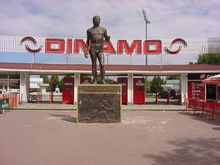
The years to come saw Dinamo in the UEFA Cup. However, without any special results, the team leaves the competition in the first qualification round, in 1993-1994 losing to Cagliari, in 1994-95 losing to Trabzonspor, and in 1996 losing to Levski Sofia.
Among the new players that play for Dinamo are: Catalin Hildan, Florentin Petre, Cosmin Contra. Alongside the famous goalkeeper Florin Prunea appear Mihalcea and Kirita. With this new team, in the 1998-1999 season Dinamo plays arguably the best football in Romania, though the team loses the title to Rapid Bucuresti. Dinamo ended the dark era of the mid 90's this way once they started to fight for the title this year, only having to wait one more year to win it with no contender.
1999-2000
Dinamo played next season in the UEFA Cup beating Benfica 1-0 on Estádio da Luz, then losing a suspected game on Lia Manoliu 2-0.
Dinamo won the title in the 1999-2000 with Adrian Mutu playing for them but lost to Polonia Warszawa in the second qualification round of the UEFA Champions League 1999-00 mostly because they sold most of the players in the Summer Mercato. This affected their next season, when they lost the title to Steaua Bucharest.
2001-2002
In 2001-02 Dinamo won the title again after a tight championship run. Dinamo managed to win the title in the last game of the season just in front of FC National. Dinamo was eliminated by FC Brugge in the UEFA Champions League 2001-02 second qualification round.
2002-2003
In the 2002-03 season Dinamo was affected again by the players who left the team, with it becoming a tradition for the leaders of the club to sell players after winning a title, losing the games in the UEFA Champions League and having a hard time in Divizia A. Dinamo changed a lot of managers and lost 7 consecutive games. After Ioan Andone came to the team, Dinamo played a spectacular semifinal with Astra Ploiesti. After losing 2-1 in Ploiesti in the middle of the crisis the team beat Astra in Bucharest 3-1 after extra time. They then went on to win the Romanian Cup, after beating FC National in the final 1-0 on a goal scored by Iulian Tames.
2003-2004
After building up a team again in 2003-04, they eliminated Shakhtar Donetsk in the first round of the UEFA Cup 2003-04 season. They went on to lose to Spartak Moscow in the second round. In the Romanian League Dinamo won the title by defeating Steaua Bucuresti in a close battle. They also won the Romanian Cup after an 2-0 win over Otelul Galati at Cotroceni.
2004-2005
For the 2004-05 season Dinamo's ambitions grew, but still a lot of players left the club. Dinamo played a thrilling game vs. Manchester United in Bucharest in the third qualification round of the UEFA Champions League, but lost 1-2. This game was significant because it showed a lot of progress from the last attempts to qualify for the group phase of the Champions League. The 2nd leg was lost at Old Trafford 3-0. In the UEFA Cup 2004-05 season Dinamo was eliminated by Partizan Belgrade. This time Dinamo had a better evolution during the season after the title victory. However, Dinamo lost the title to Steaua Bucharest on a costly error by Lucian Goian in the last seconds of the game with Rapid Bucharest in the last games of the season.
2005-2006
A highlight in recent times came in the UEFA Cup 2005-06 season when Dinamo thrashed Premier league team Everton 5-1. Dinamo went on to win the tie 5-2. For the 2005-06 season Dinamo entered a crisis in the second part of the season. Ioan Andone was fired by the new Executive President of the club Ioan Becali. Esteban Vigo was brought in, but because of the scandals inside the club Ioan Becali was kicked out and Esteban Vigo left the club as well. Dinamo counted on Ion Marin for the first games of the spring that started with a 3-0 loss to Otelul Galati. Florin Marin came and was kept manager for the rest of the season before Mircea Rednic took the job. Dinamo finished the season with a 0-0 draw against Poli Timisoara and finished 3rd to earn a very important UEFA Cup spot at the end of a horrible season.
Also in the 2005-06 season, they managed to beat CSKA Moscow (Cup Holders) 1-0 but they missed the European Spring due to a couple of close games lost in the last few seconds. Playing against Olympique de Marseille on Stade Vélodrome and trailing by 2-1 in the last moments of the game Octavian Chihaia launched a ball over Barthez and scored for 2-2 but the referee whistled the end of the game while the ball was in the air and before it entered the goal. Some claim that might have been a unique moment in the history of the European Cup Football.
2006-2007
In the 2006-07 season they did qualify for the European Spring by beating Besiktas and Bayer Leverkusen 2-1 in Bucharest, drawing 1-1 at FC Brugge and losing 3-1 in London to Tottenham Hotspur. In the next round they faced Benfica, but were eliminated after a 0-1 loss at Da Luz and a 1-2 loss at home. Domestically, the team crushed most of its opponents in the first 19 rounds, ending up autumn champions, 13 points ahead of second place. After two spectacular away wins against the rivals, 4-2 with Steaua and 4-1 with Rapid, Dinamo relaxed and let some points slip in other matches. Nevertheless, they secured their 18th title with four rounds to spare.
2007-2008
The 2007-2008 season found the Dinamo fans hoping for another title in Romania and a qualification in the Group Stage of the UEFA Champions League. Dinamo entered the competition in the third qualifying round, and faced Lazio Roma, playing the first game in Rome on Stadio Olimpico on 14 August and the 2nd leg on 28 August on Lia Manoliu National Stadium.
The game in Rome ended in a 1-1 draw. Ionel Danciulescu scored first with a perfect header after a cross from Cristi Pulhac, Lazio equalised in the 2nd half with a header from Mutarelli. In the first half Bogdan Lobont saved a penalty from Rocchi after Radu Stefan committed handball.
The second leg was played on Lia Manoliu National Stadium: the first half ended in a 1-0 lead for Dinamo, thanks to a goal scored by Florin Bratu on a 30 meter sprint; however, Dinamo suffered three goals in the second half, caused by three defensive mistakes, the first being a penalty kick scored by Rocchi after a foul by Valentin Nastase, who left the team following the match. The game ended in a 3-1 loss for Dinamo, being therefore not admitted to the group stage of the UEFA Champions League. The elimination led also Mircea Rednic to resign from his head coaching position, being replaced by Walter Zenga.[1]
Dinamo challenged Sweden champions IF Elfsborg in the UEFA Cup 1st round and where eliminated after a 1-2 loss at home and a 1-0 win in Borås. Dinamo's only achievable goal remained the Romanian Championship. Winning the title would have qualified it to the UEFA Champions League Group Stage.
Walter Zenga left Dinamo after 2 disappointing derbies against Rapid at home (lost 2-0 ) and Steaua away (lost 1-0 ) with a poor defensive play that was opposing with the team's very strong playing offensive. With no points in these crucial games he was replaced by Cornel Talnar with whom Dinamo had a debut in Liga I 3-1 against UT Arad on the 1st of December 2007.
On March 4, 2008, Gheorghe Multescu replaced Cornel Talnar but he resigned after only 27 days in charge.[2] After Multescu's resignment, Talnar is again invested as coach until the end of the championship having very good final matches against Rapid (2-1) and Steaua (2-1).Finally, Dinamo finished fourth and qualified for the UEFA Cup.
2008-2009
In the summer of 2008, Mircea Rednic returned as coach having the mission to win the title and qualify Dinamo to the UEFA Champions League Group Stage. The first half of the season found Dinamo playing some modest games against the other title contenders like Rapid Bucharest, CFR Cluj or Unirea Urziceni but in the same time they managed to beat direct rivals for the title, FC Timisoara 3-0 away. Dinamo ended the first half of the season in first place after Unirea Urziceni lost the last game against Steaua Bucharest. The second half of the season started in a promising way for the Red Dogs. Dinamo managed to beat Rapid with 3-0 at home even though Rapid was considered to be in top form and later eliminated them from the Cup with a similar 4-2 victory in Pitesti. The last 3 games of the season were against Unirea Urziceni away, FC Brasov home and FC Arges away and were 3 defeats in a row, ending in third position.
2009-2010
Dinamo played in the playoff for Europa League against Czech football club FC Slovan Liberec. In the first leg the supporters invaded the pitch causing the match to be abandoned in the 88th minute when the score was 2-0 for Slovan. The UEFA Control and Disciplinary Body awarded a default 0–3 defeat against Dinamo. One week later in Liberec Dinamo managed a memorable comeback and qualified in the Europa League 2009-10 Group Stage after winning 3-0 in Liberec after 90 and 120 minutes and winning 9-8 at penalties after 10 series. Andrei Cristea scored once and Marius Niculae twice. Dinamo was drawn in group F along Panathinaikos Athens, Galatasaray Istanbul and Sturm Graz. The first game was played against the Austrian team in Graz on 17 September and won 1-0 by the Red Dogs, but they eventually only won another game in the group, finishing 3rd in the group with two wins and four defeats.
Supporters and rivalries
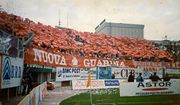
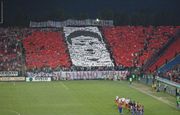
Being the second most famous club in the country, Dinamo has an estimated 15% support in Romania, making them the 2nd most supported Romanian club after Steaua and along with Universitatea Craiova. The largest concentration of fans is in Bucharest, mainly in the North-East areas of the city. The club also has important fan bases inside and outside the country.
The roots of the Dinamo ultras movement can be found in 1995 when groups like Dracula or Rams Pantelimon appear in the North End. In 1996 a group called Nuova Guardia is born, composed of young but very devoted men it will become the leading group in the red-white stands and later on in the entire Romanian ultras movement. Following the death of Catalin Hîldan in 2000 the fans renamed the North End of Dinamo's stadium to Peluza Catalin Hildan (PCH) in his honor. Today the majority of supporters are located in the PCH but several factions have moved to the South End.
Dinamo's most important rivalry is with Steaua. The match between them, Eternul Derby (The Eternal Derby), has been the leading Romanian football encounter in the last 60 years, as Dinamo and Steaua are the two most successful football teams in the country. Clashes between different factions of supporters have often occurred and still occur inside and outside the stadium. The nadir was reached in 1997 when Dinamo's fans set a sector of Steaua's stadium (Stadionul Ghencea) on fire. The result of the encounter between the two rivals is currently the following: 118 matches, 41 wins for Dinamo, 34 wins for Steaua and 43 games ended in a tie.
Other rivalries are shared with Universitatea Craiova and Rapid Bucuresti, and a minor one with Petrolul. CFR Cluj, Farul, Arges and FC Timisoara fans also consider Dinamo to be their rival, although Dinamo fans don't seem to give any special importance to the games against these teams.
 Universitatea Craiova - Dinamo |
 Dinamo - Rapid |
 Dinamo - Lazio |
 Dinamo - Steaua (2005) |
|
Dinamo - Manchester United |
 Steaua - Dinamo (2007) |
 Flares in Ghencea |
 Dinamo supporters in a match against Poli Iasi |
Honours
Domestic
- Romanian League Championship: (18)
- Winners: 1955, 1961-62, 1962-63, 1963-64, 1964-65, 1970-71, 1972-73, 1974-75, 1976-77, 1981-82, 1982-83, 1983-84, 1989-90, 1991-92, 1999-00, 2001-02, 2003-04, 2006-07
- Runners-up (20): 1951, 1952, 1953, 1956, 1958–59, 1960–61, 1966–67, 1968–69, 1973–74, 1975–76, 1978–79, 1980–81, 1984–85, 1986–87, 1987–88, 1988–89, 1992–93, 1998–99, 2000–01, 2004–05
- Romanian Cup: (12)
- Winners: 1958-59, 1963-64, 1967-68, 1981-82, 1983-84, 1985-86, 1989-90, 1999-00, 2000-01, 2002-03, 2003-04, 2004-05
- Runners-up (7): 1954, 1968-69, 1969-70, 1970-71, 1986-87, 1987-88[3], 1988-89, 2001-02
- Romanian Super Cup: (1)
- Winners: 2004-05
- Runners-up (4): 2000-01, 2001-02, 2002-03, 2006-07
International
- European Cup:
- Semi-Finalist (1): 1983–84
- UEFA Cup Winners' Cup:
- Semi-Finalist (1): 1989–90
Records in the league:
- Consecutive winning games: 17 games (12 June 1988 - 27 November 1988)
- Best unbeaten run: 47 games (26 May 1991 - 20 September 1992)
- Player with most caps: Cornel Dinu 454
- Top Scorer: Dudu Georgescu 207
- Top Scorer in international games: Claudiu Niculescu 18
Current squad
Updated last on July 30, 2010
Note: Flags indicate national team as has been defined under FIFA eligibility rules. Players may hold more than one non-FIFA nationality.
|
|
For Dinamo's second team see FC Dinamo II Bucureşti.
Out on loan
Note: Flags indicate national team as has been defined under FIFA eligibility rules. Players may hold more than one non-FIFA nationality.
|
Players with dual nationality

 29 Ousmane N'Doye
29 Ousmane N'Doye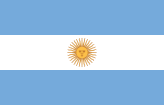
 30 Juan Pablo Garat
30 Juan Pablo Garat
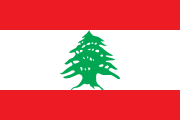 31 Elias Bazzi
31 Elias Bazzi
Shirt sponsors and manufacturers
| Kit manufacturer | Shirt partner |
|---|---|
Retired number(s)
11 – ![]() Cătălin Hîldan - Posthumous honor
Cătălin Hîldan - Posthumous honor
Since "Unicul Căpitan (The Unique Captain)" died, no player will wear the number 11 shirt at FC Dinamo, since the club decided to retire the shirt out of respect and posthumous honor for legend Cătălin Hîldan.
Managers of Dinamo
For details see Dinamo Bucharest managers
The most notable managers of Dinamo are Angelo Niculescu with two championship titles in 1955 and 1965; Nicolae Nicusor Dumitru with six championship titles in 1962, 1964, 1971, 1975, 1983 and 1984, and who qualified Dinamo in the European Champions Cup 1983-1984 season reaching the semifinals; Ion Nunweiller who won the championship in 1973 and 1977. Mircea Lucescu who managed Dinamo for five years winning two cups, one title and qualifying Dinamo in the quarter finals of the Cup Winners Cup in the 1988-1989 season, and one year later in 1989-1990 in the same competition reaching the semifinals. Cornel Dinu marked the comeback of Dinamo on the Romanian football stage winning the title in 2000, and the cup in 2001.
Notable players
Dinamo in European Competitions
European Cup Winners' Cup
| Season | Competition | Round | Country | Club | Home | Away | Aggregate |
|---|---|---|---|---|---|---|---|
| 1968-69 | European Cup Winners' Cup | First Round | Vasas ETO Győr | w/o | |||
| Second Round | West Bromwich Albion | 1-1 | 0-4 | 1-5 | |||
| 1986-87 | European Cup Winners' Cup | First Round | 17 Nëntori Tirana | 1-2 | 0-1 | 1-3 | |
| 1987-88 | European Cup Winners' Cup | First Round | KV Mechelen | 0-2 | 0-1 | 0-3 | |
| 1988-89 | European Cup Winners' Cup | First Round | Kuusysi | 3-0 | 3-0 | 6-0 | |
| Second Round | Dundee United | 1-1 | 1-0 | 2-1 | |||
| Quarter-finals | Sampdoria | 1-1 | 0-0 | 1-1 (a) | |||
| 1989-90 | European Cup Winners' Cup | First Round | Dinamo Tirana | 2-0 | 0-1 | 2-1 | |
| Second Round | Panathinaikos | 6-1 | 2-0 | 8-1 | |||
| Quarter-finals | Partizan | 2-1 | 2-0 | 4-1 | |||
| Semifinals | Anderlecht | 0-1 | 0-1 | 0-2 |
European Cup
| Season | Competition | Round | Country | Club | Home | Away | Aggregate |
|---|---|---|---|---|---|---|---|
| 1956-57 | European Cup | Preliminary Round | Galatasaray Istanbul | 3-1 | 1-2 | 4-3 | |
| First Round | CDNA Sofia | 1-1 | 1-8 | 2-9 | |||
| 1962-63 | European Cup | Preliminary Round | Galatasaray Istanbul | 1-1 | 0-3 | 1-4 | |
| 1963-64 | European Cup | Preliminary Round | Motor Jena | 2-0 | 1-0 | 3-0 | |
| First Round | Real Madrid | 1-3 | 3-5 | 4-8 | |||
| 1964-65 | European Cup | Preliminary Round | Sliema Wanderers | 2-0 | 5-0 | 7-0 | |
| First Round | Internazionale Milano | 0-6 | 0-1 | 0-7 | |||
| 1965-66 | European Cup | Preliminary Round | Odense BK | 4-0 | 3-2 | 7-2 | |
| First Round | Internazionale Milano | 2-1 | 0-2 | 2-3 | |||
| 1971-72 | European Cup | First Round | Spartak Trnava | 0-0 | 2-2 | 2-2 | |
| Second Round | Feyenoord Rotterdam | 0-3 | 0-2 | 0-5 | |||
| 1973-74 | European Cup | First Round | Crusaders FC | 11-0 | 1-0 | 12-0 | |
| Second Round | Atletico Madrid | 0-2 | 2-2 | 2-4 | |||
| 1975-76 | European Cup | First Round | Real Madrid | 1-0 | 1-4 | 2-4 | |
| 1977-78 | European Cup | First Round | Atletico Madrid | 2-1 | 0-2 | 2-3 | |
| 1982-83 | European Cup | Preliminary Round | Valerenga Oslo | 3-1 | 1-2 | 4-3 | |
| First Round | Dukla Prague | 2-0 | 1-2 | 3-2 | |||
| Second Round | Aston Villa F.C. | 0-2 | 2-4 | 2-6 | |||
| 1983-84 | European Cup | First Round | Kuusysi | 3-0 | 1-0 | 4-0 | |
| Second Round | Hamburg | 3-0 | 2-3 | 5-3 | |||
| Quarter-finals | Dinamo Minsk | 1-0 | 1-1 | 2-1 | |||
| Semifinals | Liverpool | 1-2 | 0-1 | 1-3 | |||
| 1984-85 | European Cup | First Round | Omonia | 4-1 | 1-2 | 5-3 | |
| Second Round | Girondins Bordeaux | 1-1 | 0-1 | 1-2 | |||
| 1990-91 | European Cup | First Round | St Patrick's Athletic | 4-0 | 1-1 | 5-1 | |
| Second Round | FC Porto | 0-0 | 0-4 | 0-4 |
UEFA Champions League
| Season | Competition | Round | Country | Club | Home | Away | Aggregate |
|---|---|---|---|---|---|---|---|
| 1992-93 | UEFA Champions League | First Round | Kuusysi | 2-0 | 0-1 | 2-1 | |
| Second Round | Olympique Marseille | 0-0 | 0-2 | 0-2 | |||
| 2000-01 | UEFA Champions League | Second qualifying Round | Polonia Warsaw | 3-4 | 1-3 | 4-7 | |
| 2002-03 | UEFA Champions League | Second qualifying Round | Club Brugge | 0-1 | 1-3 | 1-4 | |
| 2004-05 | UEFA Champions League | Second qualifying Round | Žilina | 1-0 | 1-0 | 2-0 | |
| Third qualifying Round | Manchester United | 1-2 | 0-3 | 1-5 | |||
| 2007-08 | UEFA Champions League | Third qualifying Round | Lazio | 1-3 | 1-1 | 2-4 |
UEFA Cup
| Season | Competition | Round | Country | Club | Home | Away | Aggregate |
|---|---|---|---|---|---|---|---|
| 1970-71 | UEFA Cup | First Round | PAOK FC | 5-0 | 0-1 | 5-1 | |
| Second Round | Liverpool | 1-1 | 0-3 | 1-4 | |||
| 1974-75 | UEFA Cup | First Round | Boluspor | 3-0 | 1-0 | 4-0 | |
| Second Round | 1. FC Köln | 1-1 | 2-3 | 3-4 | |||
| 1976-77 | UEFA Cup | First Round | Milan | 0-0 | 1-2 | 1-2 | |
| 1979-80 | UEFA Cup | First Round | Alki Larnaca FC | 3-0 | 9-0 | 12-0 | |
| Second Round | Eintracht Frankfurt | 2-0 | 0-3 | 2-3 | |||
| 1981-82 | UEFA Cup | First Round | Levski Sofia | 3-0 | 1-2 | 4-2 | |
| Second Round | Internazionale | 3-2 | 1-1 | 4-3 | |||
| Third Round | IFK Göteborg | 0-1 | 1-3 | 1-4 | |||
| 1985-86 | UEFA Cup | First Round | FK Vardar | 2-1 | 0-1 | 2-2 (a) | |
| 1991-92 | UEFA Cup | First Round | Sporting Clube de Portugal | 2-0 | 0-1 | 2-1 | |
| Second Round | Genoa | 2-2 | 1-3 | 3-5 | |||
| 1993-94 | UEFA Cup | First Round | Cagliari | 3-2 | 0-2 | 3-4 | |
| 1994-95 | UEFA Cup | First Round | Trabzonspor | 3-3 | 1-2 | 4-5 | |
| 1995-96 | UEFA Cup | Preliminary Round | Levski Sofia | 0-1 | 1-1 | 1-2 | |
| 1997-98 | UEFA Cup | First qualifying Round | KR Reykjavík | 1-2 | 0-2 | 1-4 | |
| 1999-00 | UEFA Cup | Qualifying Round | FC Mondercange | 7-0 | 6-2 | 13-2 | |
| First Round | Benfica | 1-0 | 0-2 | 1-2 | |||
| 2001-02 | UEFA Cup | Qualifying Round | Dinamo Tirana | 1-0 | 3-1 | 4-1 | |
| First Round | Grasshopper Club Zürich | 1-3 | 1-3 | 2-6 | |||
| 2003-04 | UEFA Cup | Qualifying Round | Liepājas Metalurgs | 5-2 | 1-1 | 6-3 | |
| First Round | Shakhtar Donetsk | 2-0 | 3-2 | 5-2 | |||
| Second Round | Spartak Moscow | 3-1 | 0-4 | 3-5 | |||
| 2004-05 | UEFA Cup | First Round | Partizan | 0-0 | 1-3 | 1-3 | |
| 2005-06 | UEFA Cup | Second qualifying Round | Omonia | 3-1 | 1-2 | 4-3 | |
| First Round | Everton | 5-1 | 0-1 | 5-2 | |||
| Group Stage | Heerenveen | 0-0 | |||||
| Group Stage | Levski Sofia | 0-1 | |||||
| Group Stage | CSKA Moscow | 1-0 | |||||
| Group Stage | Olympique Marseille | 1-2 | |||||
| 2006-07 | UEFA Cup | First qualifying Round | Hibernians | 5-1 | 4-0 | 9-1 | |
| Second qualifying Round | Beitar Jerusalem | 1-0 | 1-1 | 2-1 | |||
| First Round | Skoda Xanthi | 4-1 | 4-3 | 8-4 | |||
| Group Stage | Beşiktaş | 2-1 | |||||
| Group Stage | Club Brugge | 1-1 | |||||
| Group Stage | Bayer Leverkusen | 2-1 | |||||
| Group Stage | Tottenham Hotspur | 1-3 | |||||
| Round of 32 | Benfica | 1-2 | 0-1 | 1-3 | |||
| 2007-08 | UEFA Cup | First Round | Elfsborg | 1-2 | 1-0 | 2-2 (a) | |
| 2008-09 | UEFA Cup | First Round | NEC Nijmegen | 0-0 | 0-1 | 0-1 |
UEFA Europa League
| Season | Competition | Round | Country | Club | Home | Away | Aggregate |
|---|---|---|---|---|---|---|---|
| 2009-10 | UEFA Europa League | Play-off Round | Slovan Liberec | 0-3 | 3-0 | 3-3 (9–8p) | |
| Group Stage | Sturm Graz | 2-1 | 1-0 | ||||
| Group Stage | Panathinaikos | 0-1 | 0-3 | ||||
| Group Stage | Galatasaray Istanbul | 0-3 | 1-4 | ||||
| 2010-11 | UEFA Europa League | Second qualifying Round | Olimpia Bălţi | 5-1 | 2-0 | 7-1 | |
| Third qualifying Round | Hajduk Split | 3-1 | 0-3 | 3-4 |
References
- ↑ "Zenga to guide Red Dogs". Football Italia. 2007-09-05. http://www.channel4.com/sport/football_italia/sep5g.html. Retrieved 2007-09-05.
- ↑ "Multescu si-a reziliat contractul cu FC Dinamo" (in Romanian). Sport365.ro. 2008-03-31. http://www.sport365.ro/Multescu_si_a_reziliat_contractul_cu_FC_Dinamo-n53807.html. Retrieved 2008-03-31.
- ↑ The goal of Balint was anulated because of off-side, at signalling of assistant referee George Ionescu. Steaua retired from the field (after the command of Valentin Ceauşescu, the son of president Nicolae Ceauşescu) but Romanian Federation of Football offered the Cup to Steaua Bucureşti. In 1990, Steaua renounced at this trophy because it was won unjust.
External links
- (Romanian) (English) Official website
- (Romanian) DinamoMania
- (Romanian) Dinamo-OnLine
- (Romanian) (English) FcDINAMO.net - Unofficial website
- (Romanian) FCDB.ro - Fan Club Dinamo Bucuresti
- (Romanian) Red |White Pride:: Mandri de a fi Caini
- (Romanian) Page dedicated to Catalin Hildan
- (Romanian) Page dedicated to Catalin Hildan
- (Romanian) Dinamo - Liga 1 ranking
- (Romanian) All time Dinamo results in Liga 1
- (Romanian) / Suporterii Dinamovisti
Fan pages
- Fan's site
- Dinamo's supporters Community
- Brigate Dinamo
- Tifosi Ultra'
- Guardia Oradea
- Ultras Tei
- Dinamo Bucuresti statistics
- Fan Club DINAMO
- The history of Dinamo Bucharest
|
|||||||||||||||||||||||
|
|||||||||||||||||||||||
|
|||||
|
|||||
|
||||||||||||||||||||